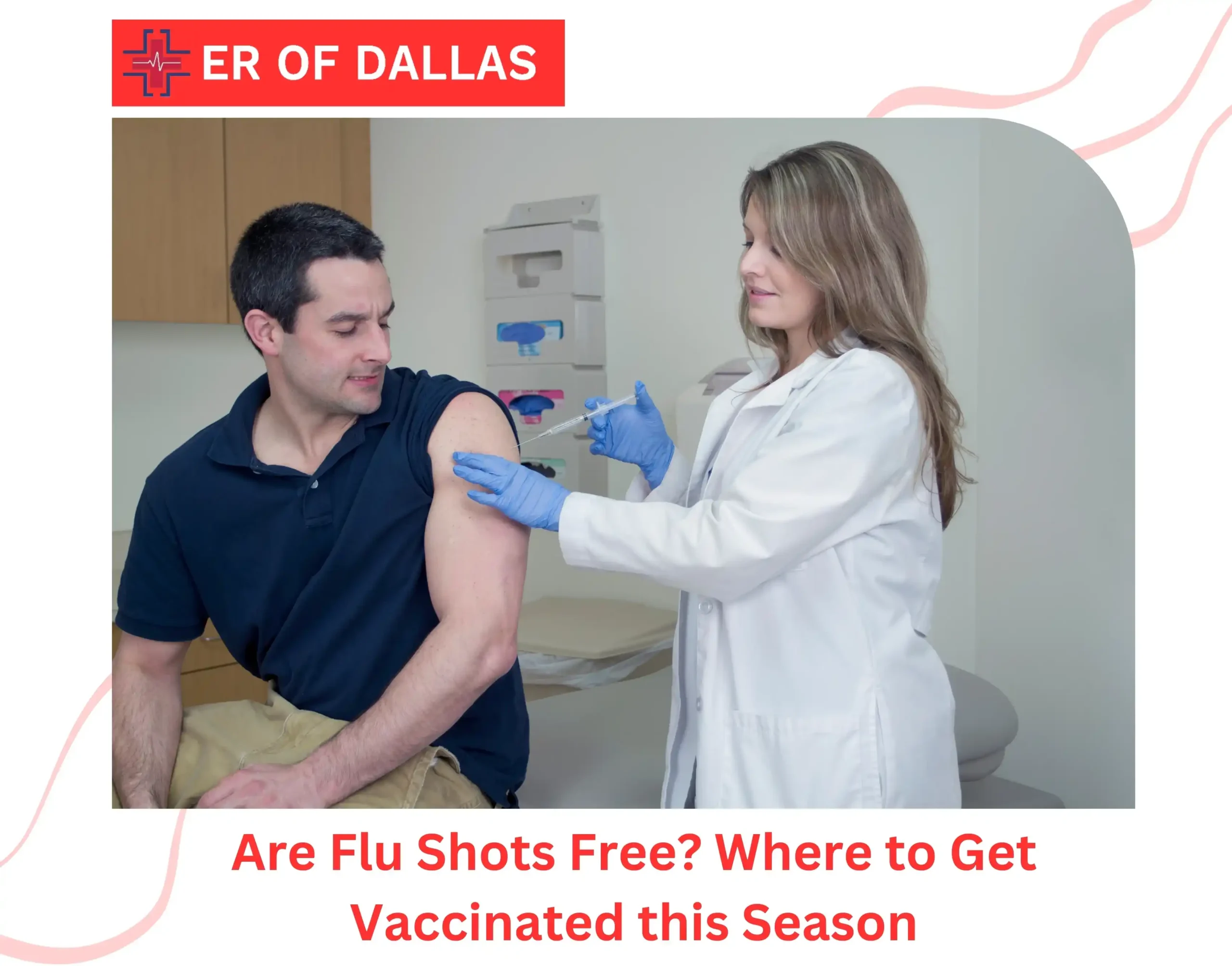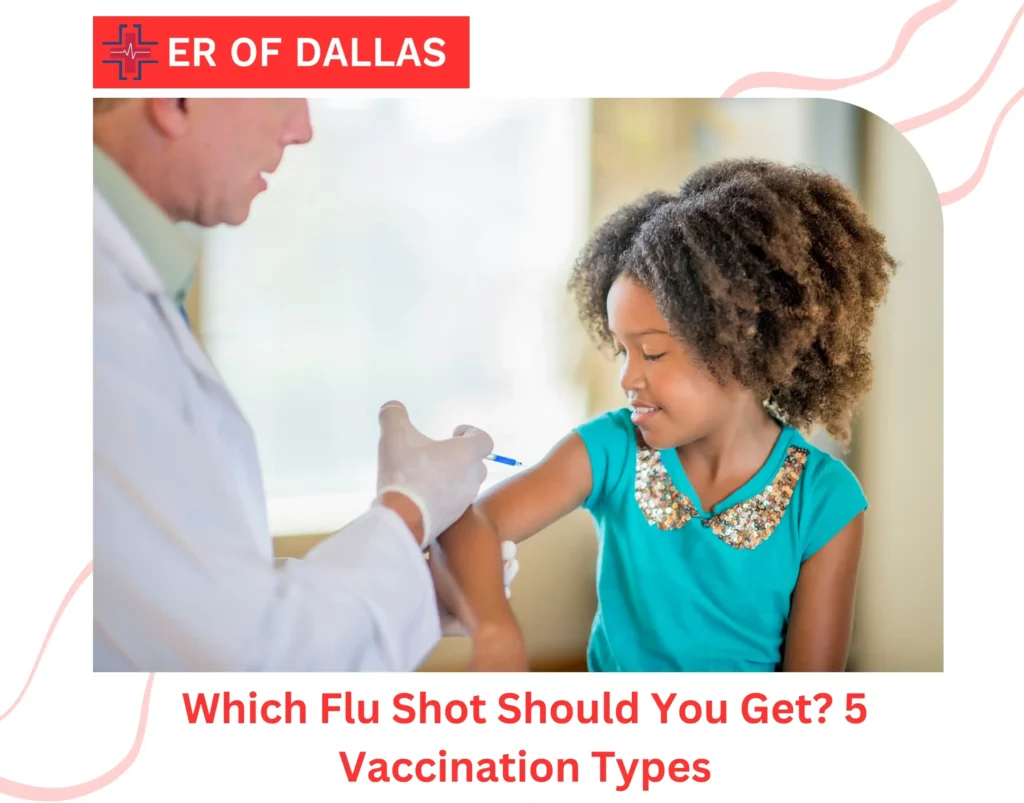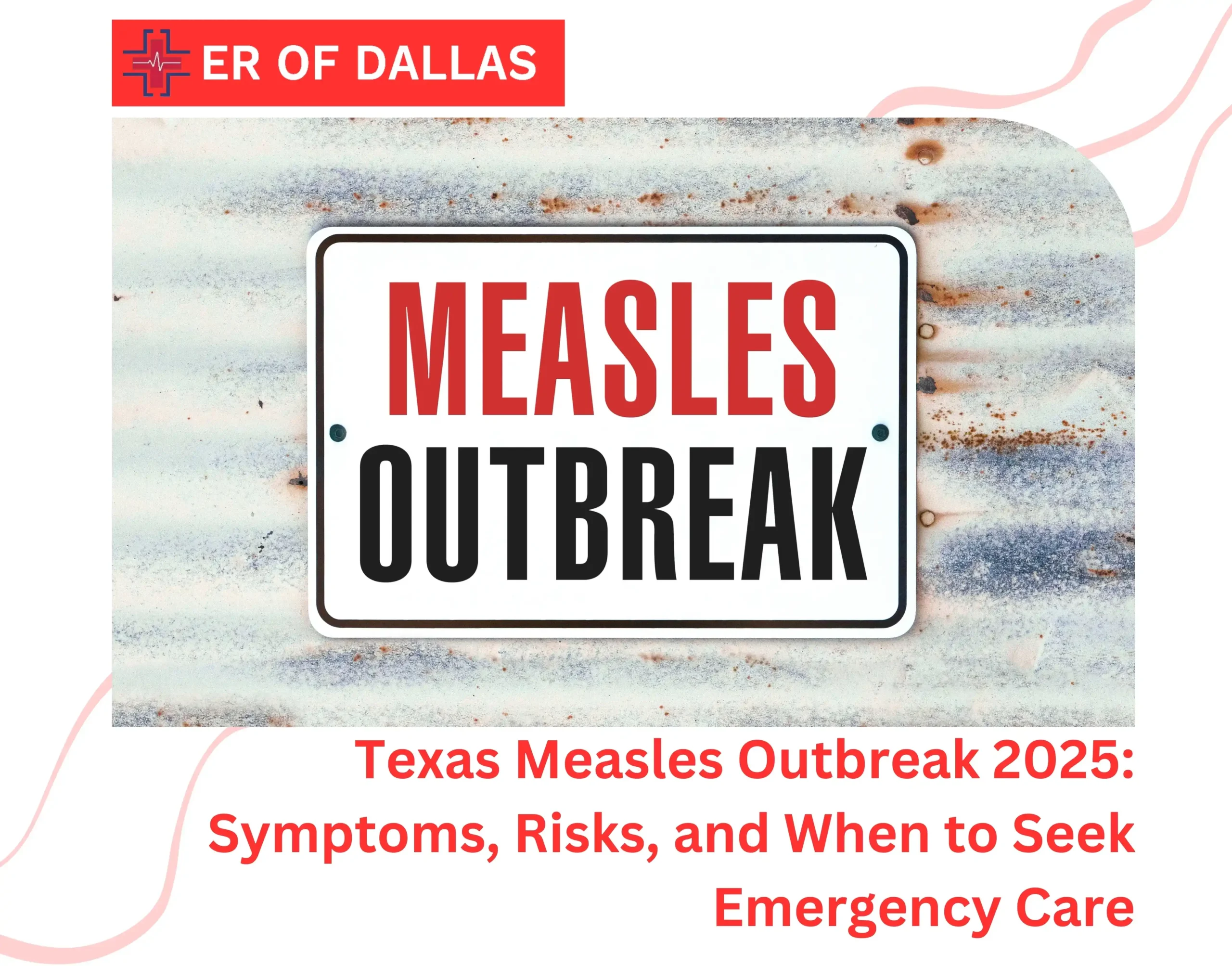Are flu shots free this season? Dallas residents can find various flu vaccination options ranging from no-cost community clinics to retail pharmacies with various pricing structures. Location choice affects not just cost, but also wait times and personalized care.
Vaccination options include retail pharmacies with extended hours, primary care offices familiar with your health history, community health centers, and workplace programs. Each service model offers different advantages depending on your schedule and health needs.
Dallas ER provides this informational guide to help you navigate the flu season effectively and recognize when symptoms require emergency flu treatment.
Understanding Free Flu Shot Availability in Dallas
“Free flu shot” signs pop up across Dallas every fall, but what’s the real story? While CVS and Walgreens advertise no-cost vaccines, they’re usually only free with insurance coverage. The truly budget-conscious should mark their calendars for community events at local schools and churches where shots are provided regardless of insurance status.
Timing matters almost as much as location. By mid-September, vaccines arrive at doctor’s offices and pharmacies, but don’t procrastinate. Popular spots like Target pharmacies sometimes run low by January. Those who wait until flu cases spike often find themselves searching multiple locations for remaining doses.
The Dallas County Health Department remains your most reliable option throughout the season. Their immunization clinics maintain steady supplies even when retail locations falter, and they accommodate both scheduled appointments and walk-ins. For families without insurance, these county-run facilities often offer sliding scale fees that can reduce costs to zero based on income.
Why Getting Your Flu Shot in Dallas Is Essential This Season
The flu (influenza) is a contagious respiratory illness caused by viruses that change and circulate every year. For many, it’s just a temporary hassle, but for older adults, young kids, and folks with ongoing health issues, flu can lead to some pretty serious complications.
Getting vaccinated each year helps:
- Reduce the spread of the flu in our community
- Minimize your chances of severe illness
- Protect vulnerable individuals around you
Flu vaccines get updated each year to match the strains expected to see, so it’s important to get your shot annually.
When to Get Flu Shot: Best Timing for Protection
The best time to get a flu shot is in September or October, before the Dallas flu season intensifies. CDC recommends getting vaccinated by the end of October, as protection takes about two weeks to develop.
Don’t worry if you miss this window. Getting vaccinated later still provides benefits. Even January vaccination helps during peak flu months (December-February).
Annual vaccination is necessary because:
- Flu viruses constantly change
- Vaccine protection decreases over time
- New formulations target currently circulating strains
For maximum protection, mark your calendar for early fall vaccination annually, especially if you’re in high-risk groups like seniors, children, or those with compromised immunity.
Where to Get a Flu Shot Near Me in Dallas
When searching “flu shots near me,” you’ll find a variety of convenient options. These include:
1. Community Health Clinics
Local health departments and nonprofit clinics often organize flu shot drives, particularly during peak flu season. Residents without insurance find their best options at these community-based centers, as they offer reduced-cost or free vaccinations based on income.
The Dallas County Public Health Department operates several immunization clinics throughout the city. Check the DCHHS website for updated schedules of these neighborhood clinics.
2. Pharmacies and Retail Clinics
Big pharmacy chains and in-store clinics have flu shots available all season long. Most allow walk-ins or same-day appointments throughout flu season, and trained pharmacists or nurses handle it.
3. Primary Care Provider Vaccinations
Your primary care doctor’s office is another solid choice for getting your shot especially if you want to chat about additional health concerns. Many practices offer flu shots during regular visits or have special appointments just for flu shots. Depending on your age and health, you may also get a Covid-19 Booster during the same visit.
4. Workplaces and Schools
Lots of employers host on-site flu shot clinics during fall months. These convenient events usually require no appointment and often come at no cost through workplace wellness programs.
Dallas schools occasionally partner with health departments for student and family vaccination days. These events extend beyond typical school hours to accommodate working parents.
| Note: It’s still possible to develop flu symptoms even after vaccination. In these cases, Dallas ER provides rapid flu testing and treatment when home care alone isn’t enough. |
When Are Flu Shots Available?
The flu shot rolls out every year starting in late summer or early fall, and most doctors recommend getting it by the end of October. However, flu season can stretch into early spring, so even getting vaccinated later can still be effective.
Timing Tips:
- September to October: Best time to get your shot
- November to January: Still effective, especially if flu season peaks later
- February onward: Can still offer protection if flu viruses are around
Your body usually takes about two weeks to build immunity after the shot, so earlier is often better especially if you’re around high-risk individuals.
Can You Get a Flu Shot and a COVID Shot Together?
Yes, it’s safe and convenient to get flu and COVID shots during the same visit. Medical professionals usually give the two vaccines in separate arms, making the process more comfortable and saving you a return trip.
The CDC confirms no waiting period is necessary between these vaccines, and studies show no decrease in effectiveness when administered together. This efficiency becomes particularly valuable for families with multiple members needing seasonal protection before cold weather health risks arise.
Who Should Get a Flu Shot?
Everyone aged 6 months and older should get flu shots, with only a few exceptions. Certain groups should prioritize it, including:
- Adults over 65
- Little kids
- Pregnant folks
- People with ongoing health issues (like asthma, diabetes, heart problems)
- Healthcare workers
- Caregivers or anyone living with high-risk people
If you’re not sure if the flu vaccine is right for you, it’s a good idea to chat with a healthcare provider.
Which Flu Shot Should You Get? 5 Vaccination Types
Different flu vaccines target specific needs and age groups. Before scheduling your appointment, consider the types of flu vaccine that might be right for you:
- Standard Quadrivalent Vaccines protect against four influenza strains and work for most people ages 6 months and older. These represent the most common option available at pharmacies and clinics throughout Dallas.
- High-Dose Vaccines contain four times the antigen amount of standard shots. CDC data shows these provide stronger protection for adults 65+ whose immune systems typically respond less robustly to standard formulations.
- Egg-Free Options include cell-based vaccines (Flucelvax) and recombinant vaccines (Flublok) for people with egg allergies. These use alternative production methods that avoid egg proteins entirely.
- Nasal Spray Vaccines offer a needle-free alternative for healthy people ages 2-49 who aren’t pregnant. This live attenuated vaccine isn’t recommended for those with certain medical conditions or compromised immunity.
- Adjuvanted Vaccines like Fluad Quadrivalent use additional ingredients to create stronger immune responses in older adults, particularly those 65+.
For the 2025-2026 season, all flu vaccines target the specific virus strains recommended by the WHO. Your doctor or pharmacist can recommend which formulation best suits your age and health status.
Are There Side Effects of Flu Shot?
Flu shots are generally safe and most people handle them well. You might not feel much at all, but if you do, you might notice:
- Soreness or swelling at the injection site
- A low fever
- Some muscle aches
- Feeling a bit tired
These minor discomforts pale compared to being bedridden with influenza for a week. Serious reactions are super rare, but if something unusual happens, let your healthcare provider know. It’s still possible to develop flu-like symptoms even after vaccination, but they’re usually milder and last shorter than true influenza. If you’ve concerns about potential reactions based on your medical history, discuss them during your vaccination visit.
Dallas Flu Protection Starts With You
Seasonal vaccination creates a barrier against influenza spread throughout our community. Each person who receives their flu shot in Dallas helps protect vulnerable neighbors who cannot receive vaccines due to medical conditions.
This year, make vaccination a priority before holiday gatherings begin. Whatever your situation, convenient options exist to fit vaccination into your busy schedule. Take this simple step toward protecting yourself and our Dallas community during the challenging winter illness season.
And if prevention isn’t enough and you find yourself battling severe symptoms like high fever or breathing difficulties, ER of Dallas provides round-the-clock flu treatment to help you recover faster.
FAQs About Flu Shots in Dallas
1. Is it necessary to get a flu shot every year?
Yes. Annual vaccination is necessary because flu viruses constantly evolve, and vaccine protection decreases over time. Each year’s formula targets the specific strains expected to circulate during the coming flu season.
2. Can you get the flu twice in one season?
Yes, it’s possible to catch the flu more than once in a season. Multiple strains circulate and immunity to one doesn’t guarantee protection against others. This explains why some vaccinated people still get sick; they encountered a different strain than those covered in the vaccine.
3. Do you have immunity after the flu?
After infection, you develop some temporary immunity to that specific flu strain, but this fades within months and doesn’t protect against other strains. Natural immunity is less predictable than vaccine-induced immunity, which is why annual flu shots are still important.
4. What’s the difference between standard and high-dose flu shots?
Standard flu shots work for most adults, while high-dose versions contain four times the antigen amount to create stronger immune responses in people 65 and older. Both types provide protection, but the high dose flu shot is often approved for older adults who benefit from the enhanced formulation.














